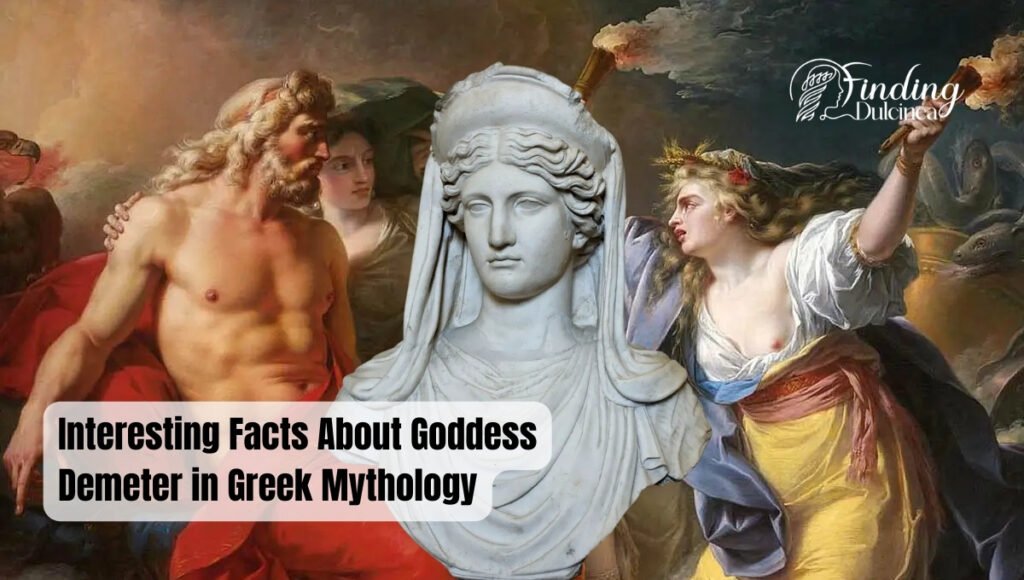Demeter, the ancient Greek goddess of the harvest, grains, and agriculture, holds a prominent place in the pantheon of gods and goddesses. Her influence extends beyond the fields, as she is also associated with health, birth, marriage, and even the Underworld. The story of Demeter and her daughter Persephone is one of the most well-known myths in Greek mythology and serves as the foundation for understanding her role and significance.
The Story of Demeter and Persephone
The Abduction of Persephone
The mythological tale of Demeter starts with the tragic abduction of her daughter Persephone by Hades, the god of the Underworld. The story unfolds as Hades, smitten by the beauty of Persephone, decides to take her as his wife and brings her down to his realm without Demeter’s consent.
In this pivotal moment, Demeter’s grief and anguish become paramount.
Demeter, who was fiercely protective of her daughter, descends into immense grief upon learning of the abduction. As the goddess of agriculture, she abandons her duties and allows the crops to wither, leading to famine and the hardship of mortals on Earth.
Zeus’ Intervention and Persephone’s Return
It is Zeus, the king of the gods, who ultimately intervenes and orders Hades to return Persephone to her mother. However, there is a catch — because Persephone ate pomegranate seeds in the Underworld, she is bound to spend a portion of the year with Hades, causing the seasons to change.
In her state of compromise and longing for her daughter, Demeter allows the Earth to flourish during the time Persephone is with her and mourns during the winter months when Persephone descends once again into the Underworld. Thus, the cyclical nature of the seasons is intrinsically tied to the goddess and her daughter.
Demeter’s Domains and Associations
The Goddess of Agriculture and Harvest
Demeter’s main domain is agriculture and the bountiful harvest that sustains humanity. In ancient Greece, crops such as wheat, barley, and grapes were closely associated with her. Farmers and communities would offer prayers, sacrifices, and perform rituals to ensure a prosperous harvest.
Connections to Health, Birth, and Marriage
Demeter’s influence extends beyond agriculture, as she is also revered for her associations with health, birth, and marriage.
Health and fertility were closely linked to Demeter, and her worship played an important role in ensuring the well-being of individuals and the preservation of life. Pregnant women sought her blessings for a safe and healthy delivery. Additionally, Demeter was considered the protector of marriages and families, providing guidance and stability to these foundational aspects of society.
Associations with the Underworld and Death
In Greek mythology, Demeter is intricately connected to the Underworld through her daughter Persephone’s abduction. Her interactions with other gods and goddesses associated with the realm of death, such as Hades and Thanatos, further emphasize her role in the transition from life to death. Some cultures viewed Demeter as a guardian and guide for souls in the afterlife.
The Eleusinian Mysteries
Overview of the Eleusinian Mysteries
The Eleusinian Mysteries were ancient religious rites and rituals dedicated to Demeter and Persephone. These mysteries were celebrated in the city of Eleusis and were considered one of the most important religious traditions in ancient Greece.
Demeter and the Mysteries
Demeter was central to the Eleusinian Mysteries, and her story of the abduction of Persephone played a significant role in the rituals and beliefs associated with these mysteries. The initiation ceremonies and rituals were believed to impart secret knowledge and provide participants with a sense of spiritual rebirth.
The mysteries were shrouded in secrecy, and those who took part were sworn to never reveal what they experienced.
The significance of the mysteries extended beyond the religious sphere and had a profound impact on agricultural and fertility practices. They were seen as a means to ensure bountiful harvests and the continuation of life itself.
Demeter in Cults and Worship
Worship Sites in Ancient Greece
The worship of Demeter was widespread throughout ancient Greece, and there were various cult sites dedicated to her. Notable among these were the temples at Eleusis, Thesmophoria, and Agrigento.
Worshipers would gather at these sites to participate in rituals and ceremonies honoring Demeter. These gatherings became integral to the local communities and fostered a sense of unity and reverence for the goddess.
Demeter in Post-Paganism
The worship of Demeter did not cease with the spread of Christianity. Instead, her identity underwent a transformation, and she became known as “Saint Demetra” in Christianized regions.
Even in modern times, elements of Demeter’s influence can be found in certain festivals and practices associated with the celebration of life and the harvest, albeit in a different religious context.
Her role as the goddess of the harvest and life continues to be recognized and celebrated, highlighting the enduring legacy of Demeter in agricultural practices and the appreciation of the natural world.
Conclusion
Demeter, the goddess of harvest and life, holds a mythical power and influence that transcends time. From her roles as the provider of sustenance and fertility to her connections to the Underworld and the mysteries of life and death, Demeter’s legacy is woven into the tapestry of ancient Greek culture.
By exploring and appreciating the complexities of Demeter’s story, we can gain a deeper understanding of our own connection to the Earth and the importance of nurturing and preserving the cycles of life.
